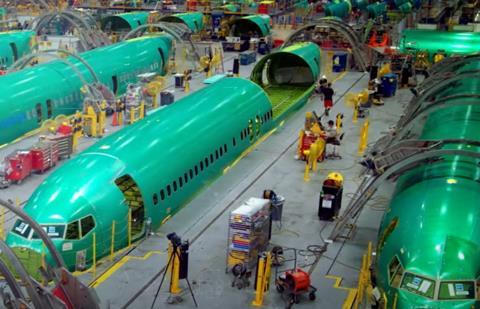Elevated costs, production slowdowns and delayed 737 fuselage deliveries drove aircraft structures producer Spirit AeroSystems to a $415 million loss in the second quarter of 2024.
The results, disclosed by the Wichita company on 5 August, mark another distressing quarter for Spirit, which has been struggling with high-profile production-quality problems, particularly related to its 737 work.
More broadly, Spirit’s operation has proved deeply vulnerable to elevated supply costs and slower-than-expected production and delivery rates. Many of its Airbus and Boeing programmes have proved significantly unprofitable amid the depressed rates at which the company and broader industry are now running.

“Events in the first half of 2024 have resulted in significant reductions in projected revenue and cash flows this year,” Spirit says. “These recent events include the production and delivery process changes implemented by Boeing, lower-than-planned 737 production rates and the lack of price increases on Airbus programmes.”
The company says it has stopped hosting conferences calls to discuss its quarterly results due to its pending acquisition by Boeing.
Spirit’s $415 million second-quarter loss compares to its $206 million loss in the same period last year. The company’s second-quarter operating costs shot up 23% year on year to $1.8 billion, while its revenue increased 9% in one year to $1.5 billion.
During the quarter, Spirit delivered only 27 737 fuselages to Boeing, fewer than half the 74 it delivered in the second quarter of 2023. The figure fell off dramatically because in March Boeing put the brakes on Spirit’s deliveries. Boeing is now conducting thorough inspections of completed fuselages in Wichita to prevent Spirit from shipping those with significant defects.
Boeing took that step following the January in-flight blow out of an Alaska Airlines 737 Max 9’s mid-cabin door plug. The plug failed after Boeing, during assembly, removed the plug to address fuselage defects. Boeing workers then replaced the plug but failed to bolt it down.
“Spirit’s deliveries continue to be delayed as the companies work together to optimise the process,” Spirit says.
With deliveries held up, Spirit continued producing 737 fuselages at a rate of 31 monthly last quarter, meaning it has rapidly been accumulating a vast fuselage inventory. Spirit derives close to half its revenue from the 737 programme.
Spirit second-quarter loss largely reflects $312 million in charges taken during the period against several of programmes. It logged forward losses of $25 million against Airbus A220 component production and $173 million against 787 work, citing “supply chain costs” and, specific to the 787, “schedule changes”.
Spirit also took a $28 million charge against its 737 programme due to delivery and production-ramp delays, and a $19 million charge against its 777 work.
Additionally, Spirit logged $46 million in second-quarter excess capacity costs.
Spirit’s executives are now seeking to secure more cash after the company ended the quarter with cash and cash equivalents valued at $206 million, down from $824 million at end-2023.
“Management has developed plans to pursue various options to improve liquidity as needed and expects these plans to sufficiently improve the company’s liquidity,” Spirit says, adding it has ability to draw funds from a new credit agreement.
Boeing on 30 June reached an agreement with Spirit to acquire that company for $4.7 billion in an all-stock transaction. The US aircraft maker views the acquisition as a means of helping stabilise its top supplier. Boeing had previously owned Spirit until spinning it off in 2005.
Also on 30 June, Airbus said it had agreed to acquire Spirit’s Airbus-related work, which would allow Boeing’s acquisition to close.


























